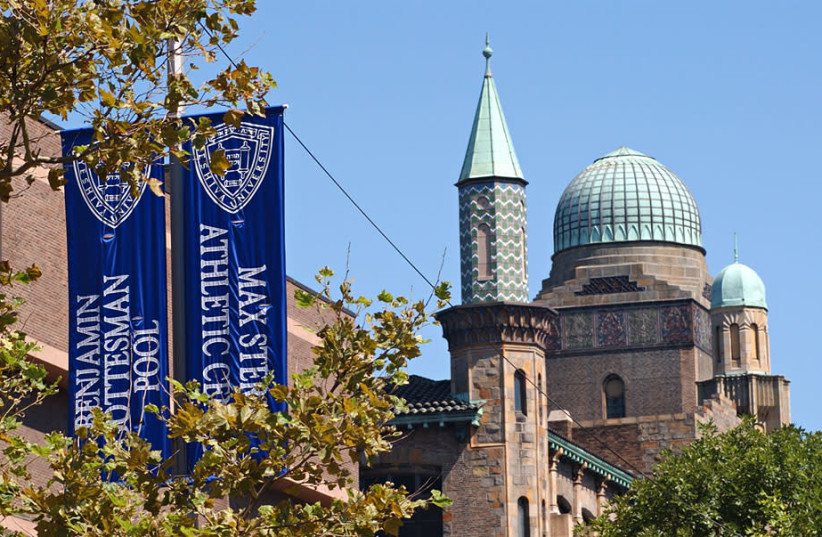The Jewish Queer Youth (JQY) organization announced that it would provide support for all Yeshiva University student clubs on Tuesday after the university announced that it would be temporarily suspending all student clubs in light of the US Supreme Court's denial of a request by YU for a stay on an order that would require them to recognize an LGBTQ+ student club.
An email sent to students read "Considering the upcoming Chagim (holidays), the university will hold off on all undergraduate club activities while it immediately takes steps to follow the roadmap provided by the US Supreme Court to protect YU’s religious freedom.”
The YU Commentator reported that sources close to the administration stated that university officials were considering dissolving all student clubs and organizations in order to avoid recognizing the LGBTQ+ club.
"YU is postponing all clubs because of the queer students. So JQY will fund all clubs because of the queer students,” said JQY executive director Rachael Fried. “If YU is going to turn this crisis on the queer students, then the leading organization serving queer Orthodox youth can stand up and say: We have all of your backs and none of you will suffer because of how YU is treating its queer students.”

Student clubs will be able to apply for up to $500 in funding per event and JQY has pledged to raise $10,000 over the next two months to temporarily cover student activities until clubs are reopened. If the university keeps the clubs closed, JQY has committed to raising funds from alumni and allies in order to keep the student clubs operating.
Fried added that the decision to temporarily shut down student clubs was an attempt to blame LGBTQ+ students for a "manufactured religious crisis” that “paints a target on the backs of queer undergraduate students.”
Supreme Court denies YU's request for a stay
Last week, the Supreme Court denied a request by YU for a stay on an order issued by the New York County Supreme Court in June requiring the university to recognize an LGBTQ+ student club called the YU Pride Alliance.
In June, the New York County Supreme Court ruled that YU needed to recognize the Pride Alliance as an official campus club, as the university is not considered a "religious corporation" and therefore is subject to the New York City Human Rights Law (NYCHRL) which prohibits discrimination on the basis of sexual orientation.
The ruling that the university is not considered a religious corporation, despite its combination of religious studies with secular studies, was based on a number of reasons, including that YU's own charter defines itself as an "educational corporation" and "exclusively for educational purposes" without mentioning a religious purpose for the institution.
Additionally, a fact sheet prepared by YU in 1995 acknowledged that the university is "subject to the human rights ordinance of the City of New York, which provides protected status to homosexuals. Under this law, YU cannot ban gay student clubs."
The majority opinion of the Supreme Court pointed out that the university still has "at least two further avenues for expedited or interim state court relief," as YU could ask the New York courts to expedite consideration of their appeal and could file a corrected motion for permission to appeal the denial of a stay issued by New York Court of Appeals.
If the university seeks these two avenues of relief and receives neither, it will be able to return to the Supreme Court.
Dissenting justices Samuel Alito, Clarence Thomas, Neil Gorsuch and Amy Coney Barrett stressed that the First Amendment does not "permit a State to force a Jewish school to instruct its students in accordance with an interpretation of Torah that the school, after careful study, has concluded is incorrect."
The justices argued that YU would likely prevail if the court reviewed the case, would suffer irreparable harm during the time it takes for the completion of the appellate process and that neither the interests of the parties nor of the public push in favor of denying the university's request. The four stressed that YU would "likely win if its case came before us."
"I doubt that Yeshiva’s return to state court will be fruitful, and I see no reason why we should not grant a stay at this time. It is our duty to stand up for the Constitution even when doing so is controversial," wrote Alito.
In a statement issued the day after the Supreme Court decision and before the decision to suspend all student clubs was announced, YU President Dr. Ari Berman stated "Every faith-based university in the country has the right to work with its students, including its LGBTQ students, to establish the clubs, places and spaces that fit within its faith tradition. Yeshiva University simply seeks that same right of self-determination. The Supreme Court has laid out the roadmap for us to find expedited relief and we will follow their instructions. At the same time, as our commitment to and love for our LGBTQ students are unshakeable, we continue to extend our hand in invitation to work together to create a more inclusive campus life consistent with our Torah values.
On Saturday, a YU spokesperson told the YU Commentator that “Our lawyers submitted the briefs on Friday as directed by the US Supreme Court. We anticipate a quick conclusion in the courts and the start of clubs soon.”
